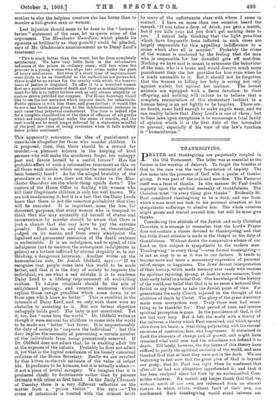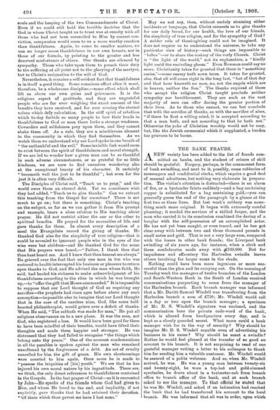THANKSGIVING.
pRAYER and thanksgiving are perpetually coupled in the Old Testament. The latter was as essential as the former in the worship of Jehovah. To forget the benefits of God to the race was the very foundation of impiety. . The Jew came into the presence of God with a psalm of thanks- giving. It was part of the ordained sacrifice. The Passover itself was a feast of thanks. In like manner St. Paul dwells urgently upon the spiritual necessity of thankfulness. The Christian must " in every thing give thanks." Evidently St. Paul considered thanksgiving to be a duty, and one from which a man must not look to his personal situation or his sympathetic sufferings to absolve him. The whole creation might groan and travail around him, but still he must give thanks.
Considering this attitude of the Jewish and early Christian Churches, it is strange to remember that the Lord's Prayer does not contain a clause devoted to thanksgiving, and that but little direct allusion is made in the Gospel to the duty of thankfulness. Without doubt the comparative silence of our Lord on this subject is sympathetic to the modern man. Thanksgiving "in every thing "—even formal thanksgiving— is not as easy to us as it was to our fathers. It tends to become more and more a momentary expression of personal relief, escape, or happiness. The Jews' devout interpretation of their history, which made memory ever ready with reasons for spiritual rejoicing, sprang, at least in some measure, from their early belief in a tribal God. Our knowledge of the history of the world, our belief that God is in no sense a national God, forbid us any longer to take the Jewish point of view. For generations the early Church rejoiced- in the thought of the abolition of death by Christ. -The glory of the great discovery made even martyrdom easy. Truly those men had some- thing to be thankful for! That period of keen and intense spiritual perception is gone. In the providence of God, it did not last very long. But it left the world with a theory of the universe, a theory which Paul conceived, and which sprang alive from his brain, a vital thing palpitating with the eternal emotions of contrition, love, and forgiveness. It contained in itself the elements of change and of growth, and might have remained vital until now had the schoolmen not defined it to death. Till lately, however, the dry bones of this theory have sufficed to pacify the spiritual curiosity of the world, and men thanked God that at least they were not in the dark. We are beginning to feel now that the great plan of God is beyond our grasp ; that St. Paul was right when he confessed that after all he bad not altogether apprehended it; and that it has been analysed since his time by no ecclesiastical Com- mittee whatever. We cannot any longer thank God that we, without merit of our own, are redeemed from an eternal torture to which others, without fault of their own, are condemned. Such thanksgiving would stand between our
souls and the keeping of the two Commandments of Christ. Even if we could still hold the terrible doctrine that the God in whom Christ taught us to trust was at enmity with all those who had not been reconciled to Him by correct con- viction, compassion would seem to us a more worthy emotion than thankfulness. Again, to come to smaller matters, we can no longer rouse thankfulness in our own breasts, nor in those of our friends, by pointing to the greater and less deserved misfortunes of others. Our thanks are silenced by sympathy. Those who take upon them to preach their duty to the suffering at all point not to the glorying of the martyrs, but to Christ's resignation to the will of God.
Nevertheless, it remains a self-evident fact that thankfulness is in itself a good thing. Some conscious effort after it must, therefore, be a wholesome discipline,—some effort which shall lift us above our own gains and grievances. It is the religious aspect of gratitude, and they are ungrateful people who are for ever weighing the exact amount of the benefits they have received, and for ever missing the eternal values which defy calculation. In the stiff spirit of rebellion which to-day forbids so many people to bow their heads in thankfulness to God or man there lurks a strange weakness. Cowardice and selfishness prey upon them, and they cannot shake them off. As a rule, they are a mischievous element in the community in which they find themselves. As we watch them we understand why our Lord spoke in one breath of " the unthankful and the evil." Some invisible link would seem to exist between the spirit of thankfulness and moral strength. If we are led to wonder bow a given man can be so thankful in such adverse circumstances, or so grateful for so little kindness, we are sure to find ourselves wondering also at the exceptional beauty of his character. It certainly " becometh well the just to be thankful"; but even for the just it is often very difficult.
The Disciples of Christ said, "Teach us to pray," and the world owes them an eternal debt. Yet we sometimes wish they had added, " Teach us to give thanks." Can we extract this teaching from the Gospel for ourselves ? There is not much to go on ; but there is something. Christ's teaching on the subject, so far as we can gather it from His precept and example, bears a close relation to His teaching about prayer. He did not restrict either the one or the other to spiritual benefits. He prayed for the necessities of life, and gave thanks for them. In almost every description of a meal the Evangelists record the giving of thanks. He thanked God also for the simplicity of true religion—that it could be revealed to ignorant people who in the eyes of the wise were but children—and He thanked God for the sense that His prayers were heard,—" Father, I thank thee that thou haat heard me. And I knew that thou hearest me always." He grieved over the fact that only one man in ten who was restored to health interrupted his business or pleasure to return open thanks to God, and He advised the man whose faith, He said, had healed his sickness to make acknowledgment of his thankfulness according to the rites in which he was brought up,—to "offer the gift that Moses commanded." It is impossible to suppose that our Lord thought of God as requiring any sacrifice—the prophets had risen ages before above any such conception—impossible also to imagine that our Lord thought that in the case of the careless nine, God, like some half- hearted philanthropist, would grieve over a deficit of thanks. When He said, " The sabbath was made for man," He put all religious observances on to a new plane. It was the men, not God, who registered a loss. It would have been good for them to have been mindful of their benefits, would have lifted their thoughts and made them happier and stronger. He was distressed that they had failed to recognise "the things which belong unto thy peace." One of the severest condemnations in all the parables is spoken against the man who remained nnsoftened by the forgiveness of a debt. An act of cruelty cancelled for him the gift of grace. His own shortcomings were counted to him again. Once more he is made to "possess the iniquities of [his] youth." We see that he has injured his own moral nature by his ingratitude. These are, we think, the only direct references to thankfulness contained in the Gospels. In the last prayer of Christ—as it is recounted by John—He speaks of the friends whom God had given to Him, and whom He loved to the end, and implicitly, if not explicitly, gave thanks that he had retained their devotion. " Of them which thou gayest me have I lost none." Iday we not say, then, without unduly straining either incidents or language, that Christ counsels us to give thanks for our daily bread, for our health, the love of our friends, the simplicity of true religion, and for the sympathy of God ? A nobler rule of thanksgiving could not be imagined. It does not require us to understand the universe, to take any particular view of history—such things are impossible to " babes "—or to share the ecstasy of the early Church. Christ is " the light of the world," not its explanation, a "kindly light amid the encircling gloom." Even Newman could say no more. Christianity takes for granted that there is " something amiss,"—some enemy bath sown tares. It takes for granted, also, that all will come right in the long last, " but of that day and that hour knoweth no man, no, not the angels which are in heaven, neither the Sou." The thanks required of those who accept the religion Christ taught preclude neither sympathy nor bewilderment. They are such as the vast majority of men can offer during the greater portion of their lives. As to those who cannot, we can but conclude that with the sacrifice of thanks, as with the sacrifice of alms, "if there be first a willing mind, it is accepted according to that a man bath, and not according to that he 'bath not." Otherwise the yoke of Christian worship would not be easy, but, like the Jewish ceremonial which it supplanted, a burden too grievous to be borne.

























































 Previous page
Previous page